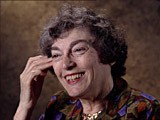You searched for: Auschwitz
<< Previous | Displaying results 771-780 of 878 for "Auschwitz" | Next >>
-
Thomas Buergenthal reflects on the importance of memorials
Oral HistoryJudge Thomas Buergenthal was one of the youngest survivors of the Auschwitz and Sachsenhausen concentration camps. He immigrated to the United States at the age of 17. Judge Buergenthal devoted his life to international and human rights law. He served as chairman of the United States Holocaust Memorial Museum’s Committee on Conscience; was named the Lobingier Professor of Comparative Law and Jurisprudence at the George Washington University Law School; and served for a decade as the American judge at…
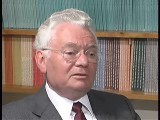
-
David (Dudi) Bergman describes liberation by US Army in mountains near Innsbruck
Oral HistoryThe Germans occupied David's town, previously annexed by Hungary, in 1944. David was deported to Auschwitz and, with his father, transported to Plaszow. David was sent to the Gross-Rosen camp and to Reichenbach. He was then among three of 150 in a cattle car who survived transportation to Dachau. He was liberated after a death march from Innsbruck toward the front line of combat between US and German troops.
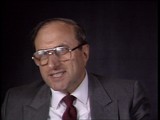
-
Hana Mueller Bruml describes black market activity in the Theresienstadt ghetto
Oral HistoryIn 1942, Hana was confined with other Jews to the Theresienstadt ghetto, where she worked as a nurse. There, amid epidemics and poverty, residents held operas, debates, and poetry readings. In 1944, she was deported to Auschwitz. After a month there, she was sent to Sackisch, a Gross-Rosen subcamp, where she made airplane parts at forced labor. She was liberated in May 1945.
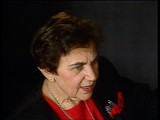
-
Hana Mueller Bruml describes preparations for a Red Cross visit to Theresienstadt
Oral HistoryIn 1942, Hana was confined with other Jews to the Theresienstadt ghetto, where she worked as a nurse. There, amid epidemics and poverty, residents held operas, debates, and poetry readings. In 1944, she was deported to Auschwitz. After a month there, she was sent to Sackisch, a Gross-Rosen subcamp, where she made airplane parts at forced labor. She was liberated in May 1945.
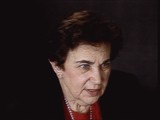
-
William (Welek) Luksenburg describes the first night of the German invasion of Poland
Oral HistoryShortly after the German invasion of Poland in September 1939, William's family was ordered into a ghetto and his brother went to a work camp. William bribed officials to discharge his brother from a hospital destined for evacuation to Auschwitz. Later, after escaping from a prison camp to tend to his brother, William was jailed. He was sent to Blechhammer, Gleiwitz (where he met his future wife), and other camps. William collapsed during a death march near the Austrian border, but was then liberated. His…
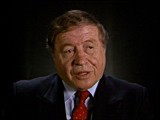
-
Beno Helmer describes conditions in the Lodz ghetto
Oral HistoryAs a young man, Beno used his foreign language skills to land small movie roles. He and his family were deported to the Lodz ghetto, where they struggled daily to find food. In the underground, Beno became an expert at derailing trains. The family was sent to Auschwitz and was separated. All but Beno and one sister, whom he found after the war, died. Beno survived a series of camps and later helped to track war criminals.
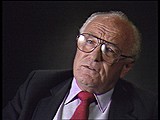
-
Leo Schneiderman describes conditions in the Lodz ghetto
Oral HistoryThe Germans invaded Poland in September 1939. Leo and his family were confined to a ghetto in Lodz. Leo was forced to work as a tailor in a uniform factory. The Lodz ghetto was liquidated in 1944, and Leo was deported to Auschwitz. He was then sent to the Gross-Rosen camp system for forced labor. As the Soviet army advanced, the prisoners were transferred to the Ebensee camp in Austria. The Ebensee camp was liberated in 1945.
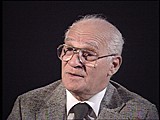
-
Murray Pantirer describes the antisemitic climate in postwar Krakow
Oral HistoryThe Germans occupied Krakow in 1939. Murray's family was confined to the Krakow ghetto along with the rest of the Jewish population of the city. In 1942, Murray and a brother were deported for forced labor in the nearby Plaszow camp. In May 1944, his brother was transferred to Auschwitz and Murray was sent to the Gross-Rosen camp in Germany. Murray was later transferred to Bruennlitz, in the Sudetenland, as a forced laborer for German industrialist Oskar Schindler. Schindler helped the Jews who worked for…
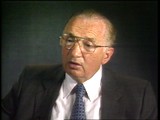
-
Hana Mueller Bruml recalls the occupation of Prague
Oral HistoryIn 1942, Hana was confined with other Jews to the Theresienstadt ghetto, where she worked as a nurse. There, amid epidemics and poverty, residents held operas, debates, and poetry readings. In 1944, she was deported to Auschwitz. After a month there, she was sent to Sackisch, a Gross-Rosen subcamp, where she made airplane parts at forced labor. She was liberated in May 1945.
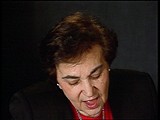
-
Gerda Haas describes prewar Jewish community life in Ansbach
Oral HistoryGerda was raised in a religious family in the small town of Ansbach, Germany, where her father was the Jewish butcher. She attended German schools until 1936, and then moved to Berlin to attend a Jewish school. She returned to her hometown after Kristallnacht in November 1938. Her family was then ordered to move to Munich, and in July 1939 her father left for England and then the United States. He was unable to arrange for the rest of his family to join him. Gerda moved to Berlin in 1939 to study nursing.…
